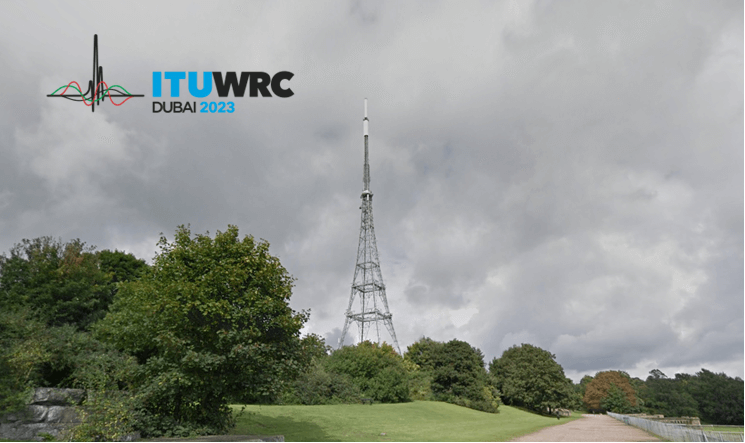An international conference that will determine if Freeview and other digital terrestrial television services can continue broadcasting beyond 2030 has started.
- The World Radiocommunications Conference runs from today until 15th December.
- It will make a decision on how frequencies will be allocated.
- In addition to Freeview, the decision could affect the use of wireless technology used at big events like Glastonbury and Eurovision.
A decision made thousands of miles away in the next four weeks could seal the fate of Freeview in the UK and Saorview in Ireland.
Dubai’s World Trade Center will become the centrepiece of discussions over the use of radio-frequency spectrum over the next four weeks. Recent World Radiocommunications Conferences have gathered more interest than usual because of its decisions that affect how free-to-air television is offered.
Previous conferences have resulted in the 700 and 800 MHz spectrum, previously used for TV services, being reallocated to 4G and 5G mobile services. For TV viewers, that’s resulted in retunes and aerial upgrades. For transmitter operators, that’s resulted in work on transmitter masts. The recently dismantled temporary tower at Emley Moor in West Yorkshire was direct result of a previous World Radiocommunications Conference: tower owner Arqiva had to replace existing antenna to broadcast on new frequencies.
At the moment, Freeview frequencies are only secure until 2030. But administrations across Europe, including Ofcom in the UK, have been pushing for no change – keeping the status quo.
However, that may only guarantee ongoing use of frequencies for another four years, as the decision would be revisited at the next World Radiocommunications Conference in 2027.
UK hopes to buy time
Decision-makers in the UK hope that an extra four years will be enough time to get viewers switched from terrestrial to streaming services. Key to that assumption is Freely – the recently announced streaming replacement from the operator of the Freeview and Freesat platforms.
Elsewhere in Europe, broadcasters and governments are working on 5G Broadcast becoming the main replacement for universal free-to-air television. This would inherit the current terrestrial TV frequencies, and could co-inhibit the space with Programme Making and Special Events.
Meanwhile, Ireland’s RTÉ only last week confirmed it was planning to launch a next-gen Saorview product in 2025, making use of the country’s improving fibre broadband network.
Programme Making and Special Events concerns
Those involved in Programme Making and Special Events are also closely looking at events in Dubai. Their wireless equipment uses spare capacity alongside terrestrial TV frequencies.
The frequencies involved are ideal for concerts – as body interference is minimal within this frequency range. This allows artists to roam freely across the stage and still be heard.
Without the frequencies, events like Glastonbury and Eurovision would struggle to be covered, and even some theatres would be affected.
In the USA, where frequencies have already been allocated to mobile services, sound engineers already report “no-go” areas for events.
What do other countries think?
The ITU splits the world into multiple regions. The UK and Ireland belong to ITU Region 1. Therefore any change will affect not just the UK and Ireland, but all of Europe, Middle East and Africa.
Europe appears to be united on keeping the status quo – no change – for the next four years. And there is support from Africa. But Arab countries have already pushed for the harmonisation of the terrestrial band for mobile internet. This is hardly surprising, as satellite and increasingly IPTV are the dominant methods of watching TV. Terrestrial TV is limited in places, including Dubai.
Other ITU regions, including Region 2 (which includes USA), have already made more terrestrial TV frequencies available to mobile network operators.
Why do mobile network operators want more frequencies?
The frequencies involved are not the best for high speed connections, but they do penetrate further. Mobile network operators argue the extra spectrum will fill in coverage holes and will prepare the way for new, innovative uses for 5G and potentially 6G services.
▶ What is the World Radiocommunications Conference?
The World Radiocommunications Conference – or WRC-23 – is organised by the International Telecommunications Union (ITU). Although its origins date back to 1865 as the International Telegraph Union, it’s now a specialised agency of the United Nations.
As a result, the decisions made at the Conference will be binding on participating states. For example, if the WRC-23 determines the frequency band used for terrestrial TV should be reassigned by a certain date, countries will need to adhere by that.
Of interest is Resolution 235, a review of spectrum in the frequency band used by terrestrial TV services.
But delegates will also discuss matters such as
- regulatory provisions related to earth stations on board unmanned aircraft which operate with geostationary-satellite networks,
- the use of frequency banks by aeronautical and maritime earth stations in motion communicating with geostationary space stations in the fixed-satellite service
- considerations to improve utilisation of VHF maritime frequencies
- protection of radio spectrum-reliant weather sensors used for global prediction and warnings.
Marc Thornham
[Image: Storm clouds over the Crystal Palace transmitter, as WRC-2023 determines future lifespan of terrestrial TV.]

